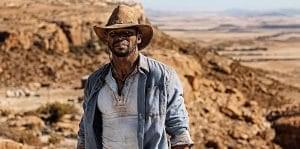
Set in the dusty rural mountains of South Africa’s Eastern Cape province, Michael Matthews’ Five Fingers for Marseilles is an original South African film, but done in the style of a classic American Western. It has garnered rave festival reviews following a well received debut at the 2017 Toronto Film Festival.
The story kicks off with a visit from corrupt police to the small poor town of Marseilles. Five friends are swept up in events following harassment by the officials and the policemen are killed on the road out of Marseille after arresting the female member of the group and driving away with her.
The friends are forced into hiding, and the strongest of them Tau (Vuyo Dabuka), who shot the cops, goes on the run, leaving his friends to deal with the fallout in Marseilles. He embarks on a life of crime and is eventually captured and spends many years in prison. While incarcerated, Tau becomes a gangster folk anti-hero called The Lion of Marseilles.
Released from prison decades later, Tau returns to Marseilles to find that the town has prospered while he was away, but that there’s always someone who wants to claim power at the expense of the innocent. Seeking only a peaceful pastoral life in his hometown, he finds he must fight, again, to protect those he cares for. This is an uncomfortable position for him as he lacks a real moral center. Having embraced a life of violence and chaos, he’s not looking to be an avenging angel.
Tau encounters an archetypal set of personalities in his town: weak and strong, good and bad, pure and corrupt, all making up the fabric of the new Marseilles he’s coming home to.
The use of the American Western film trope is only the most superficial aspect of this intelligent and layered film, but it’s a great way into the story for outsiders, a brilliant context to engage foreign audiences in the lives of people halfway around the world who look and sound different. Western first-world viewers may not understand the culture of Africa, but certainly will relate to the laconic lone hero reluctantly defending the people of a small, dusty town from ruthless opportunists bent on oppressing them. Shane is Shane, in any place, at any time, in any color skin.
Much has been made of Dabula as a “black cowboy,” but there’s no white savior in this film: the only possible cowboy in the rural Eastern Cape is a black cowboy. That level-set removes any other expectation, allowing the story to play without race as a factor.
Consequences of actions figure thematically in the notion that we become, eventually and ultimately, the results of all the things we’ve done.

“…having embraced a life of violence and chaos, he’s not looking to be an avenging angel.“
Harvey Dent in The Dark Knight gave voice to an old idea: “you either die a hero or you live long enough to see yourself become the villain.” It becomes clear in Marseilles the old ways that once were salvation had become perverted into a destructive force and when that specter looms they must be renounced and cleared away.
Superb acting by all the leads and supporting players populate the desolate landscape with human dramas large and small in a place where people scrape a living out of harsh conditions. Matthews brings the viewer an experience of a distant place and people in a familiar, relatable way: a wonderful achievement both for film and cultural understanding.
U.S. distribution for the film has been secured and it will be In theaters in September starting in New York and L.A.
Five Fingers for Marseilles (2018). Directed by Michael Matthews. Written by Sean Drummond. Starring Vuyo Dabula, Zethu Dlomo, Garth Breytenbach, Anthony Oseyemi.
8 out of 10

